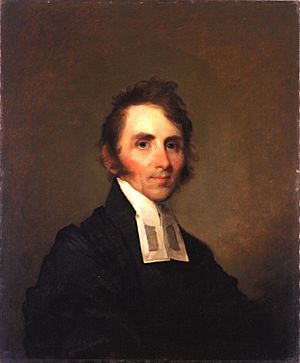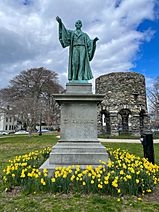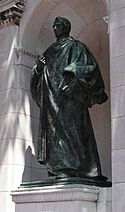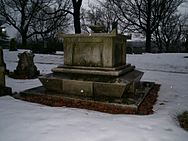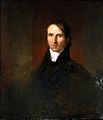William Ellery Channing facts for kids
Quick facts for kids
William Ellery Channing
|
|
|---|---|
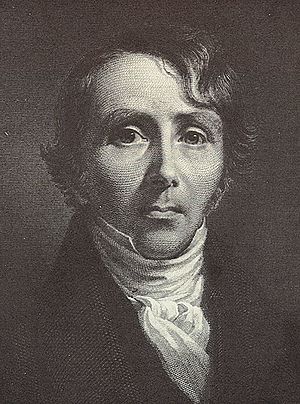 |
|
| Born | 7 April 1780 Newport, Rhode Island, U.S.
|
| Died | 2 October 1842 (aged 62) Old Bennington, Vermont, U.S.
|
| Resting place | Mount Auburn Cemetery Cambridge, Massachusetts, U.S. |
| Education | Harvard University |
| Occupation | Unitarian preacher |
| Parent(s) | William Channing Lucy Ellery |
| Relatives | William Ellery (grandfather) William Francis Channing (son) William Ellery Channing (nephew) William Henry Channing (nephew) |
| Signature | |
William Ellery Channing (born April 7, 1780 – died October 2, 1842) was a very important Unitarian preacher in the United States during the early 1800s. He was known for his powerful speeches and deep ideas. Channing's thinking helped shape a religious movement called Unitarianism. This movement focused on a loving God and the importance of human reason.
His ideas also influenced the New England Transcendentalists, even though he thought some of their views were too extreme. One of his most famous speeches was the "Baltimore Sermon" in 1819. In this sermon, he explained the main beliefs of Unitarianism.
Contents
Life and Work
Early Life and Education
William Ellery Channing was born on April 7, 1780, in Newport, Rhode Island. His parents were William Channing and Lucy Ellery. His grandfather, William Ellery, was a famous person who signed the United States Declaration of Independence.
As a child, a formerly enslaved woman named Duchess Quamino helped care for him. She later influenced his thoughts on ending slavery. Channing grew up to reject some older religious ideas, like those of Calvinism, which taught that people were born completely bad.
Channing went to Harvard College. This was a difficult time because of the recent French Revolution. He graduated first in his class in 1798. He was chosen to speak at graduation, but the college told him not to talk about the French Revolution or other political topics.
Becoming a Theologian
Channing believed in a kind and loving relationship with God, which was different from the strict religious views common at the time. After college, he spent two years in Richmond, Virginia, working as a tutor. He faced many personal struggles before finding his strong faith.
In 1803, Channing became the pastor of the Federal Street Church in Boston. He stayed there for the rest of his life. He tried to find a middle ground between very liberal and very conservative religious groups. In 1809, he became a member of the American Academy of Arts and Sciences.
Channing became a leading voice for Unitarianism. In 1819, he gave his famous "Baltimore Sermon" in Baltimore, Maryland. In this speech, he explained key Unitarian beliefs. These included rejecting the idea of the Trinity (that God is three persons in one) and believing in human goodness. He also stressed that religious ideas should be understood through reason.
In 1828, he gave another important sermon called "Likeness to God." In this speech, Channing suggested that humans have the potential to be like God. This idea was seen as very controversial by many religious leaders of his time. He also said that people could find truth through reason, not just from the Bible.
Later Years and Views on Slavery
Later in his life, Channing started talking about slavery. He wrote a book called Slavery in 1835. At first, he was not a strong supporter of the abolitionist movement, which wanted to end slavery immediately. He believed that African people were inferior and would need guidance after being freed. He also didn't like how some abolitionist groups acted.
However, his views changed over time. He saw that when slavery ended in the British West Indies in 1834, it did not cause the problems many people expected. This made him support immediate abolition more strongly.
In 1837, Channing wrote a public letter to Senator Henry Clay. In it, he spoke against the United States taking over Texas. He argued that the Texas Revolution was "criminal."
Channing also wrote a lot about American literature. He believed that a nation's literature shows "the expression of a nation's mind in writing."
Death
William Ellery Channing died in Old Bennington, Vermont. He is buried in Mount Auburn Cemetery in Cambridge, Massachusetts.
Legacy
- In 1880, a book about Channing called William Ellery Channing, A Centennial Memory was published.
- The Channing Memorial Church was built in Newport, Rhode Island, in 1880. It was built to celebrate 100 years since his birth.
- A bronze statue of Channing was put up in Newport's Touro Park in 1892.
- Another bronze statue of Channing was placed in the Boston Public Garden in 1903. It stands near the Arlington Street Church where he preached.
- A portrait of him hangs in the First Unitarian Church of Baltimore.
- Channing School, a school for girls in Highgate, North London, was named after him. It was started in 1885 for the daughters of Unitarian ministers.
- Channing had a big impact on the Transcendentalism movement. Two of his nephews, Ellery Channing and William Henry Channing, became important members of this movement.
Images for kids
-
Portrait of Channing by Washington Allston, 1811
See also
 In Spanish: William Ellery Channing para niños
In Spanish: William Ellery Channing para niños
- Federal Street Church (Boston)
- William Francis Channing, his son
 | Selma Burke |
 | Pauline Powell Burns |
 | Frederick J. Brown |
 | Robert Blackburn |


